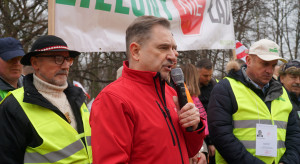Polish coastal fisheries are facing huge problems. Many fishermen are on the verge of collapse. We talk about the most serious problems with Ireneusz Nowak, a fisherman from Mrzeżyno.
Ireneusz Nowak’s family has been involved in fishing for generations. As our interlocutor emphasizes, there has never been such a difficult situation. Many fishing farms are in decline, and all attempts to normalize the situation in the sector are futile.
Farmer: What problems is the fishing industry currently facing in your region?
Ireneusz Nowak: We have major fishing restrictions. First of all, it’s about cod, salmon and herring. Practically all fish. There are no restrictions on turbot, but it occurs in small quantities.
What would have to happen for a Polish fisherman to have a chance to survive?
Today, we need financial support and support in fishing permits and in increasing catches of certain fish. This will enable us to survive, but if we cannot fish, for example we only have a small amount of herring to catch, and here we are eaten by seals, we will not survive. We won’t survive, there’s no way. The Baltic Sea has been overfished and degraded, so there is no possibility. Yesterday my father came to see me and said that he used to catch the amount of herring that we now have limits with a cap – that’s what he said.
Limits are the problem
We are talking about limits that are placed on you. Because some of them amount to ridiculous amounts.
Yes. The limits for cod fishing are, for example, 200 kg in the western stock and 400 kg in the eastern Baltic Sea. Additionally, vessels up to 12 m in length cannot engage in targeted cod fishing, whereas in the Baltic Sea, vessels from neighboring countries such as Germany, Scandinavia and the Finns can. Our government does not agree to such solutions.
You talked about seals. This is another problem you face.
There are a lot of seals and cormorants. These animals should be there, we cannot get rid of them completely, but we cannot allow seals to take over the entire Baltic Sea. Secondly, it is a pest. The seal has been a pest in the Baltic Sea all its life and is still treated as a pest in other countries because it carries the nematode. Seal nematodes appear in fish and, for example, the poor condition of cod is primarily due to the nematodes, because when the fish is attacked by the parasite, it is impossible to gain weight.
In your conversation, you mentioned the quantities of seals that should and are present. Can you elaborate on these data?
Last year, German ecologists estimated there were about 160,000 in the Baltic Sea. Such a seal can eat 20 kg of fish a day, so that’s a plus or minus, so it turns out that these seals eat 800 tons of fish a day. These are very large quantities. There should be a maximum of 2,500 seals in the Baltic Sea.
Forage fishing is a huge threat
You mentioned that feed fishing and industrial fishing are a very big threat.
Yes, feed, because we can distinguish between feed and industrial. Industrial, such as squeezing oil from sprats. In my opinion, industrial fishing should not be touched, it should exist. We should not prohibit these large vessels from fishing, but as an industry, and not just as feed. Already at this point, the Scandinavians are landing lands in such a way that they grind everything so that it is not even known what they are bringing, what quantities of by-catches of individual fish they have, including protected fish. We don’t know, because the fish is ground immediately and everything comes out ground into keja. The ship reaches the quay, the hold is closed, it goes to the grinder and the ready, ground fish is poured onto the quay and goes straight to flour for processing in the plant.
What exactly is the problem with forage fishing?
This is a huge problem that results from the quantities these units catch. These are large units that catch 100 or even 150 tons from one haul. They can load 2 or 3 thousand tons and then sail to the port. Without any fishing or weather restrictions. We are unable to withstand such competition. Especially when new restrictions are imposed on us.
Thank you for the conversation.
– .


